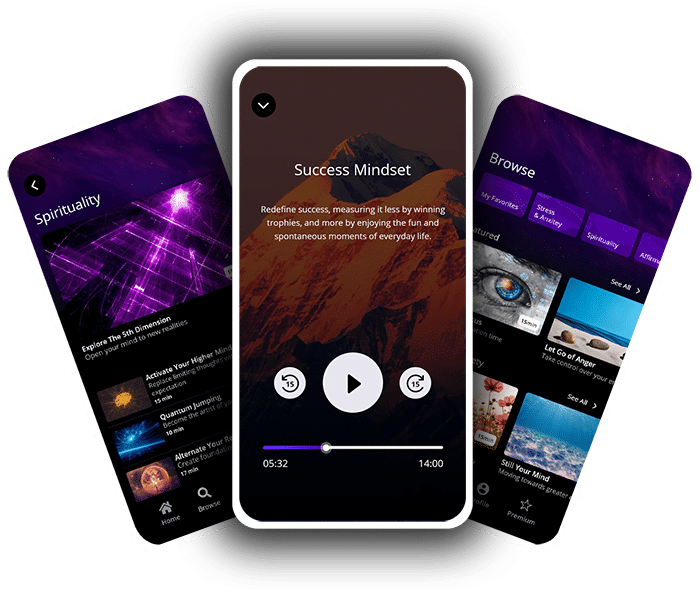Are you struggling to drift off into a peaceful slumber or looking for ways to improve sleep quality? Look no further! Meditation for sleep offers the perfect solution by combining relaxation techniques, mindfulness, and visualization to help ease your mind and prepare your body for deep rest.
Research shows that those who practice this type of meditation enjoy higher-quality sleep and improved overall well-being.
Try this one of the most relaxing sleep meditations!

Unleash Your True Potential!
Explore the world of meditation with our powerful guided sessions crafted to bring peace and strength to your spirit.
But first, let’s ensure our sessions are the perfect fit for you.
Take our short quiz to find out!
Table of contents
Key Takeaways
- Guided meditation for sleep combines many techniques to help ease your mind and prepare your body for deep rest. It has been shown to improve both the quality and duration of sleep.
- The benefits of guided sleep meditation include reducing stress and anxiety, promoting relaxation and deep rest, calming the mind and body, reducing insomnia and sleep-related issues, increasing energy and productivity, boosting the immune system, and enhancing sleep and duration.
- To prepare for guided sleep meditation, it’s important to create a peaceful environment by dimming lights or removing distractions. Setting sleep intentions or goals. Choosing the right meditation app or program. Something that suits your preferences & practicing meditation techniques regularly.
- By incorporating meditation into your bedtime routine, you will wake up feeling refreshed & rejuvenated in the morning. Enjoying increased overall well-being due to better sleep hygiene resulting in deeper restorative slumber each night.

What Is Meditation For Sleep?
Sleep meditation is a powerful and effective technique that helps individuals achieve a deep state of relaxation, paving the way for more deep sleep.
This practice combines visualization, mindfulness, and relaxation techniques intended to gently ease your body and mind into a calmer state, ultimately leading to improved slumber.
As you engage in this form of meditation regularly, it can become easier for you to drift off into peaceful sleep each night. For instance, one popular meditation involves focusing on releasing tension from each part of the body, starting at the toes and working upwards towards the head, while using distractions such as soft lights or soothing sounds in order to maintain focus throughout.
In essence, sleep meditation harnesses distinct techniques – including mindfulness exercises like mindful body scanning – packaged within easy-to-follow programs led by experienced guides or apps available online, such as Enhanced Meditation. Meditation apps have been shown time after time by research studies as having long-lasting positive effects on improving overall sleep among users who dedicate themselves consistently over periods ranging anywhere from just a few sessions all way up to years of consistent usage every single day without fail!
Understanding The Benefits Of Guided Sleep Meditation
Guided sleep meditations offer a variety of benefits, including reducing stress and anxiety, promoting relaxation response, calming the mind and body, reducing insomnia and sleep-related issues, increasing energy and productivity, boosting the immune system, and enhancing sleep quality and duration.

Reducing Stress And Anxiety
Guided sleep meditation is a powerful tool for reducing stress and anxiety, which are common culprits that hinder a good night’s rest. By calming the nervous system and moving your body out of fight-or-flight mode, this type of meditation allows you to relax both physically and mentally.
Incorporating mindfulness practices into your bedtime routine can be particularly beneficial in quieting racing thoughts before sleep. As you focus on present-moment sensations like your breath or body scan techniques, anxious thought patterns tend to fade away.
Promoting Relaxation And Deep Rest
One of the key benefits of guided sleep meditation is its ability to promote relaxation and deep rest. By engaging in a practice that focuses on calming both your body and mind, you free yourself from the stressors and distractions of everyday life.
As you follow the instructions along with the sound of the soothing voice guiding your slow breathing and visualization, tension dissipates from each muscle group, allowing for a sense of tranquility to envelop you.
For example, imagine lying down after a long day’s work with racing thoughts about upcoming deadlines or household chores that need attention. Engaging in meditation can help combat these anxious thoughts by redirecting focus towards breath awareness or peaceful visualizations such as drifting along calm waters or walking under a dark, starry sky.
Calming The Mind And Body
Meditation for sleep is an excellent way to calm both your mind and body. By engaging in mindfulness exercises, visualization techniques, and deep breathing exercises, you can activate the parasympathetic nervous system that helps you relax.
This practice has been shown to reduce stress and anxiety levels significantly, leading to more peaceful sleep.
Studies have found that people who practiced meditation experience a decrease in cortisol levels (a hormone linked with stress) compared to those who didn’t engage in any form of relaxation technique.
This calming effect on the mind and body contributes significantly to getting sleep by reducing the impact of distractions or negative emotions that may interfere with ability to fall asleep quickly and stay asleep throughout the night.
Reduced Insomnia And Sleep-Related Issues
One of the most significant benefits of sleep meditation is its ability to reduce insomnia and other sleep-related issues.
Research has shown that people who practice meditation experience fewer instances of insomnia and other sleep disorders.
Whether you’re dealing with stress-induced insomnia or simply having trouble shutting off your brain at night, practicing guided sleep meditations could be a game-changer for improving your nightly rest.
Increased Energy And Productivity
Practicing guided sleep meditation can also enhance your energy and productivity during the day. When you get a good night’s rest, it allows your body and mind to repair and recharge, which leads to increased alertness and focus.
You may find that you’re more motivated to tackle tasks throughout the day with less fatigue or brain fog. Research supports this idea, as several studies show how mindfulness meditation helps improve cognitive performance, including memory retention and attention span.
Boosted Immune System
In addition to promoting relaxation and enhancing the quality of sleep, sleep meditation has been shown to have a positive impact on the immune system.
Stress is known to weaken the immune response, leaving individuals more susceptible to illness. By reducing stress and anxiety through sleep meditations, the body can better defend itself against harmful pathogens.
Furthermore, by improving overall health and well-being, meditation can indirectly boost immunity. Getting high-quality sleep regularly is essential in maintaining good physical health as it allows the body to recharge its energy reserves and repair cellular damage incurred during waking hours.
Several studies have linked improved sleep with stronger immunity against infections like colds and flu.
Enhancing Sleep Quality And Duration

Sleep meditation has been shown to improve both the quality and duration of sleep. In fact, research indicates that those who practice this form of meditation experience higher-quality rest and have much easy time falling and staying asleep afterward.
By calming both the mind and body, meditation can also help reduce insomnia as well as other sleep-related issues. The technique can increase energy levels during waking hours by promoting a more productive slumber at night.
Furthermore, regularly practicing meditation may support and even boost the function of your immune system, leading to fewer illnesses over time.
Preparing For Meditation For Sleep
Preparing for meditation for sleep involves creating a peaceful environment, setting intentions and goals, choosing the right guided meditation, and practicing breathing techniques.
Creating A Peaceful Environment
Creating a peaceful environment is important when practicing sleep meditation. Here are some tips to help set the mood and create an atmosphere that promotes relaxation:
- Dim the lights or turn them off completely to reduce visual stimulation.
- Remove any distracting objects or clutter from the room.
- Use aromatherapy diffusers or candles to create a calming scent in the air.
- Play soothing music or nature sounds in the background to enhance relaxation.
- Adjust the temperature of the room to a comfortable level, usually between 60 to 67 degrees Fahrenheit.
- Make sure your bed is comfortable and supportive, with clean sheets and blankets.
- Consider using blackout curtains or sleep eye mask if outside light is disturbing your sleep environment.
By creating a peaceful environment before starting your sleep meditation, you can further enhance its effectiveness in promoting deep rest and relaxation.
Setting Intentions And Goals

Before beginning meditation for sleep, it’s important to set intentions and goals. This means taking some time to think about what you hope or expect to achieve from the session, whether that’s reducing stress and anxiety or simply enhancing your overall sleep.
For example, if you’re dealing with racing thoughts before bed, your intention might be to quiet the mind and let go of any distracting thoughts. Or if you discover you’re struggling with insomnia, your goal may be to achieve deep relaxation and promote deep sleep.
Research shows that setting intentions before meditating can enhance focus, reduce stress levels, and improve overall well-being – all crucial components for achieving better sleep.
Choosing The Right Sleep Meditation
Choosing the right sleep meditations for sleep is crucial to ensure a restful night. With countless options available, it’s important to find one that resonates with you and aligns with your intentions and goals.
Consider what type of meditation style you prefer, whether it be body scan, visualization, or mindfulness techniques. Some apps like Enhanced Meditation offer specific meditations designed for better sleep quality or reducing stress before you head to bed.

Unleash Your True Potential!
Explore the world of meditation with our powerful guided sessions crafted to bring peace and strength to your spirit.
But first, let’s ensure our sessions are the perfect fit for you.
Take our short quiz to find out!
Research shows that those who practice meditation experience higher-quality sleep and reduced insomnia symptoms. So take some time to explore different programs and experiment until you find one that works best for you.
Practicing Breathing Techniques
To prepare for sleep meditation, it’s important to practice deep breathing techniques. Here are some helpful techniques:
- Diaphragmatic Breathing: Also called belly breathing, this technique involves inhaling deeply through the nose and focusing on filling your abdomen with air rather than your chest. Hold for a few seconds, then exhale slowly through the mouth.
- Box Breathing: This technique involves inhaling for four counts, holding for four counts, exhaling for four counts, and holding again for four counts before starting the cycle again.
- Counting Breath: Simply count each inhale and exhale up to 10 before starting over. If you lose track of the count or get distracted, just start over at one.
- Equal Breathing: Inhale and exhale through the nose while counting to an equal length of time. For example, inhale counting three and exhale for a count of three.
Practicing these breathing techniques can help calm the mind and lower stress and tension in the body before bedtime. Additionally, for adults, research shows that deep breathing can enhance the quality of sleep by promoting relaxation and reducing insomnia.
Techniques For Meditation For Sleep
The techniques for sleep meditation include body scan meditation, visualization meditation, mindfulness meditation, positive affirmations, and yoga Nidra.
Body Scan Meditation
Body scan meditation involves directing your attention to different parts of your body, one at a time, and becoming aware of the sensations in each body part.
During a falling asleep meditation for body scanning, the instructor may instruct you to lie on your back or in any comfortable position while still awake and focusing on breathing.
Then you may be instructed to start your journey by identifying any areas of tension or discomfort in the body and then slowly moving through each part of the body with intention and compassion.
Research shows that practicing regular body scan meditation can help ease stress levels and decrease symptoms associated with anxiety disorders such as depression.
It also helps in reducing pain levels and reducing blood pressure which ultimately contributes to achieving soothing sleep.
Visualization Meditation
Visualization meditation is a technique that involves creating mental images to achieve relaxation and improve the quality of sleep. During this type of meditation, you will imagine yourself in a peaceful place, whether it be lying on the beach or standing in a field of flowers.
You can also visualize yourself thinking about accomplishing your goals or anything that may contribute to bringing you peace and happiness.

Research shows that visualization meditation can have significant benefits in improving sleep quality. In fact, studies have found that those who practice this type of meditation experience way improved sleep with fewer interruptions throughout the night.
Additionally, visualization techniques may help calm racing thoughts before bedtime, a method that can aid in falling asleep faster.
Related: 4 Must Try Vivid Visualization Tips – How To Visualize In Meditation
Mindfulness Meditation
One of the most common types of guided sleep meditation is mindfulness meditation. This technique is based on focusing on the present and acknowledging any thoughts, feelings, or sensations that arise without judgment.
Several studies have shown mindfulness meditation can improve sleep hygiene, quality, and duration. It can also help a lot to reduce stress and anxiety levels, which can often lead to difficulty sleeping.
Mindfulness sleep exercises include techniques such as mindful body scanning, breathing deeply, and staying mindful of outside distractions while drifting off into deep sleep.
Positive Affirmations
Positive affirmations are a powerful tool to include in sleep meditation. These statements that promote self-acceptance and optimism can help change negative thought patterns and bring about feelings of calmness and relaxation.
Affirmations such as “I am at peace” or “I trust my body’s ability to rest” can be repeated silently or out loud during the course of the meditation practice, helping individuals shift their mindset before falling asleep.
Multiple studies have shown that repeating positive affirmations can enhance mental well-being, reduce anxiety, and improve the quality of sleep.
Yoga Nidra

Yoga Nidra is a meditation technique that is designed to help calm the mind and body, reduce stress, and promote relaxation before sleep. It involves lying down in a comfortable position while an instructor or pre-recorded audio guides you through a series of visualizations, guided imagery, and breathing exercises.
This meditation technique works by activating the parasympathetic nervous system, which helps move the body out of fight-or-flight mode and settle into deep relaxation. By focusing on breath awareness and visualization techniques, practitioners can ease racing thoughts before bedtime and experience deeper restorative slumber.
Related: Unlock the Power of Yoga Nidra Meditations – Find Inner Peace and Clarity
Conclusion
Incorporating meditation for sleep into your bedtime routine can be a game-changer. By lowering stress and anxiety, promoting relaxation and deep rest, calming the mind and body, easing insomnia, increasing energy and productivity, boosting the immune system, and enhancing the overall restful sleep experience.
So why not give it a try tonight? Create a peaceful environment with no outside world distractions. Choose a comfortable position, and get a pillow, focus on soothing breathing patterns while listening to relaxing sounds or music. Calm your mind & allow yourself to drift off into sweet slumber.
FAQs:
1. How can meditation help me sleep better?
Meditation helps calm your mind, relax your body, and reduce stress. By focusing on specific breathing techniques, mental imagery, or affirmations during a guided session, you can quiet any persistent thoughts. Meditating will also help create an optimal environment for restful slumber.
2. Can anyone practice sleep meditation?
Yes! Anyone can practice these meditation techniques as long as they have access to quiet space where they can relax. There are many free resources, like apps like Enhanced Meditation, blogs, or podcasts dedicated to this type of relaxation technique.
3. When is the best time to practice meditation before bed?
The ideal time varies by individual preference, but recommended times include 15-20 minutes prior to planned bedtime. If practiced consistently over time – you’ll begin experiencing improved mood & decreased anxiety within a matter of weeks, if not days.
4. What should I do if I fall asleep during a meditation session?
If you fall asleep during a session, don’t worry! This is normal because it means that your body has reached a state of deep relaxation. This makes it easier for you to achieve healthy sleep patterns naturally over time without needing additional intervention or medicine.










